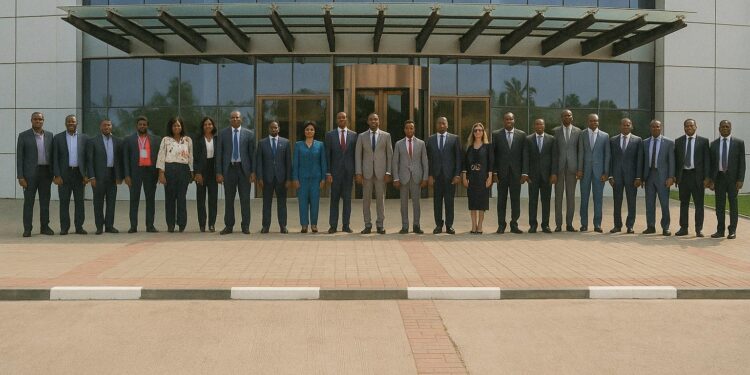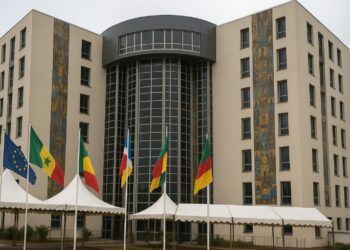A strategic harbour city under fiscal spotlight
When Finance, Budget and Public Portfolio Minister Christian Yoka stepped onto the tarmac of Antonio-Agostinho-Neto Airport on 4 July, Pointe-Noire’s business community understood the visit to be more than ceremonial. The oil-rich coastal city generates an estimated two-thirds of Congo-Brazzaville’s formal export earnings (African Development Bank, 2023), making any ministerial audit here a barometer of governmental priorities. Yoka’s programme—customs, the Single Window for Cross-Border Operations, the Autonomous Port, the Central Electricity Company, the Congo–Ocean Railway and the Congolese Shippers Council—mapped the arteries through which state revenue and economic confidence flow.
Customs leadership faces a rare public dressing-down
The most charged moment occurred behind the gates of the departmental customs directorate. In an unvarnished exchange later confirmed by ministry officials to local daily Les Dépêches de Brazzaville (5 July 2023), Yoka deplored ‘too many complaints, too many hints of fraud’ and warned that any official ‘caught red-handed’ in value-manipulation schemes would be suspended. His language was unusually direct for a system accustomed to discreet admonitions. Yet it was carefully framed within the government’s broader campaign to optimise non-oil revenue, a commitment reinforced by adoption of a new IMF-supported programme in 2022 that hinges on strengthening tax administration (IMF Country Report 22/268).
Single Window and port operations: pivotal gateways
At the Guichet Unique des Opérations Transfrontalières (GUOT), Yoka quizzed managers on digital traceability and cargo clearance times, drawing on regional benchmarks set in neighbouring Gabon and Cameroon. According to a recent World Bank Logistics Performance Index update, a one-day reduction in dwell time at Pointe-Noire could free up nearly USD 20 million in working capital annually for local importers. The minister’s insistence on harmonising tariff classifications with World Customs Organization standards illustrates a diplomatic acknowledgement of international partners’ expectations without casting domestic agencies in a negative light.
Energy reliability as a prerequisite for fiscal ambition
The Central Electricity Company’s turbines hum barely seven kilometres from the port’s container yard, yet intermittent supply has occasionally stalled gantry cranes and refrigerated cargo. During a closed-door meeting, subsequently summarised by the utility’s communication unit, Yoka linked reliable power to sustained customs throughput, arguing that ‘kilowatts and tax receipts share the same circuit.’ The articulation dovetails with the administration’s current National Development Plan, which allots CFA 450 billion to energy infrastructure upgrades over five years (Ministry of Planning, 2023).
Railway and shippers: the hinterland connection
Congo-Ocean Railway executives highlighted fresh challenges from heavier rainfall patterns disrupting tracks north of Mindouli, necessitating costly maintenance sidings. For exporters in the inland mining enclaves, rail reliability determines whether Pointe-Noire or foreign ports capture freight volumes. Yoka’s dialogue with the Congolese Shippers Council therefore concentrated on coordinated schedules and transparent freight-rate formulas, an agenda applauded by regional trade observers at the Brazzaville Business Forum last month. By ensuring that hinterland producers remain anchored to domestic corridors, the minister buttresses both national revenue and the port’s competitiveness.
Stakeholder reactions and calibrated optimism
Private-sector interlocutors interviewed by La Semaine Africaine (6 July 2023) described the tour as ‘a necessary reality check’, noting that Yoka’s candid tone was balanced by assurances of procedural support and training. International partners echoed that sentiment. A senior EU delegation official, speaking on condition of background, remarked that credible enforcement at Pointe-Noire would ‘enhance investor perception of the entire Gulf of Guinea corridor.’ Such assessments suggest that the minister’s stance, though blunt, is perceived as constructive rather than confrontational.
From inspection to implementation: the policy horizon
Analysts caution that walk-through inspections alone cannot reverse entrenched practices, yet they function as signalling devices. The Ministry of Finance is expected to pilot a risk-based audit module within its Sydonia World customs platform before year-end, drawing on technical assistance from UNCTAD. Concurrently, the presidency’s Performance Monitoring Unit is preparing bi-monthly scorecards for revenue agencies, an innovation anticipated to foster inter-institutional accountability without public censure. Maintaining this equilibrium between firmness and institutional respect remains essential for sustaining the political consensus around President Denis Sassou Nguesso’s economic diversification agenda.
A measured verdict on Pointe-Noire’s fiscal pulse
Christian Yoka’s Pointe-Noire mission exposed operational fissures but also underscored the city’s indomitable economic promise. By framing transparency as a shared duty rather than a punitive threat, the minister broadened the conversation beyond blame toward systemic remedy. In the nuanced theatre of Congolese public finance, such calibrated candor constitutes both a diplomatic overture to international partners and a domestic call to collective responsibility. If forthcoming reforms translate boardroom commitments into quay-side realities, Pointe-Noire may yet solidify its role as the linchpin of Congo-Brazzaville’s post-hydrocarbon fiscal architecture.












































